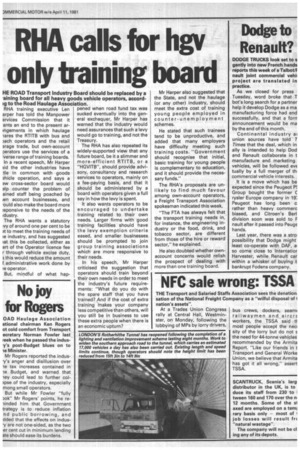RHA calls for hgv only training boa
Page 5

If you've noticed an error in this article please click here to report it so we can fix it.
HE ROAD Transport Industry Board should be replaced by a .aining board for all heavy goods vehicle operators, accordig to the Road Haulage Association.
RHA training executive Len arper has told the Manpower urvices Commission that it ants an end to the present aringements in which haulage iares the RTITB with bus and mch operators and the retail 3rage trade, but own-account Derators use the services of a verse range of training boards. In a recent speech, Mr Harper id the other industries have :tie in common with goods ahicle operation, and says a aw cross-sector board would alp counter the problem of ained staff being poached by yvn account businesses, and • ould also make the board more tsponsive to the needs of the idustry.
The RHA wants a statutory vy of around one per cent to be 3t to meet the training needs of le industry, and has suggested at this be collected, either as art of the Operator licence fee r through vehicle excise duty, 3 this would reduce the amount I administrative work done by le operator.
But, mindful of what hap pened when road fund tax was sucked eventually into the general exchequer, Mr Harper has warned that the industry would need assurances that such a levy would go to training, and not the Treasury.
The RHA has also repeated its widely-supported view that any future board, be it a slimmer and more-efficient RTITB, or a "HGVITB", should provide advisory, consultancy and research services to operators, mainly on a fee-paying basis, and that it should be administered by a board with operators given a full say in how the levy is spent.
It also wants operators to be encouraged to undertake training related to their own needs. Larger firms with good training facilities should have the levy exemption criteria eased, and smaller businesses should be prompted to join group training associations which are more responsive to their needs.
In his speech, Mr Harper criticised the suggestion that operators should train beyond their own needs in order to meet the industry's future requirements: "What do you do with the spare staff that you have trained? And if the cost of extra training Makes your company less competitive than others, will you still be in business to use these extra people when there is an economic upturn? Mr Harper also suggested that the State, and not the haulage (or any other) industry, should meet the extra cost of training young people employed in counter-unemployment schemes.
He stated that such trainees tend to be unproductive, and added that many employers have difficulty meeting such training costs. "Government should recognise that initial, basic training for young people is complementary to education, and it should provide the necessary funds."
The RHA's proposals are unlikely to find much favour among own-account operators, a Freight Transport Association spokesman indicated this week.
"The FTA has always felt that the transport training needs in, for instance, the engineering industry or the food, drink, and tobacco sector, are different from those of the hire or reward sector," he explained.
He also doubted whether ownaccount concerns would relish the prospect of dealing with more than one training board.




































































































